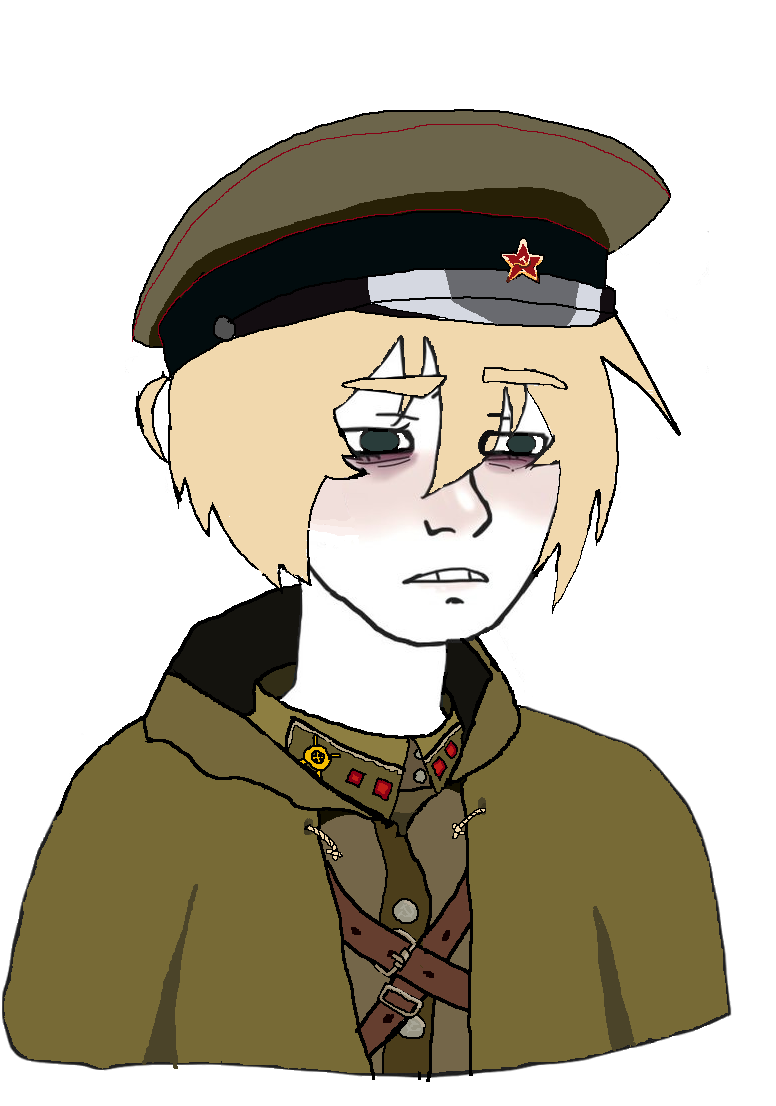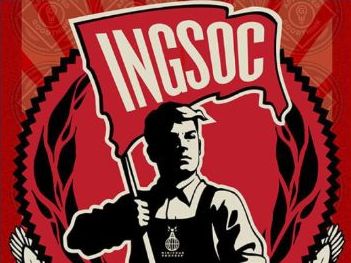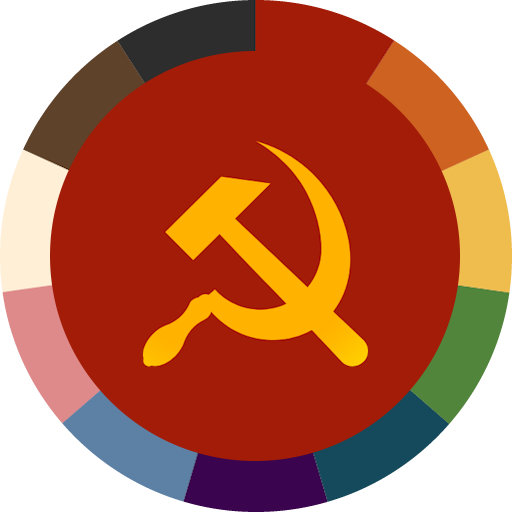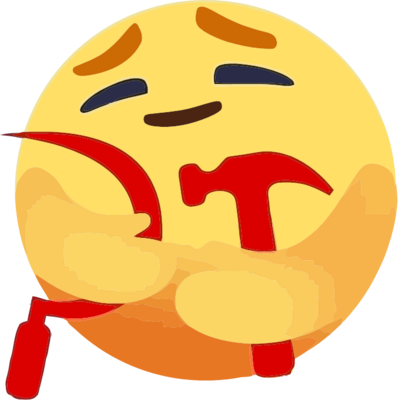

I got whooped as a kid and I turned out alright!
(THE DEMONS IN MY BRAIN YEARN FOR ESCAPE. AHHHGAGAHAHEHEHHFFUCKKKK)
Yeah, I turned out alright.
She/her. 24


I got whooped as a kid and I turned out alright!
(THE DEMONS IN MY BRAIN YEARN FOR ESCAPE. AHHHGAGAHAHEHEHHFFUCKKKK)
Yeah, I turned out alright.


“Where you have you been for 8 years?”
Like, literally. Where have y’all liberals been? I suppose even asking the question makes us Kremlin stooges.
Navalny, the guy who called Muslims cockroaches?
Navalny, the guy who was already imprisoned and posed literally no threat to Russia from behind bars? That Navalny?
You’re worse than QAnon types.


THE FUCKING COMMIES WENT AND BLEW UP THE MOON


Part of the point, right? Zionists themselves are some of the most antisemitic people on the planet, claiming Jews simply naturally cannot exist with gentiles because they’re built different, because Jews can never be accepted by the rest of the world, so they should all emigrate (or be forcefully relocated) to the Colony.
It works in the antisemitic Zionist’s favor if the meaning of antisemitism is obscured to beyond the point of nonsense. Everything is antisemitism but genuine antisemitism.
(I believe I’m aware of most of this because of you, anbol, thanks for your amazing work again.)


Colonialists will forget about or handwave atrocities that occured 10, 20, 30, 40 years ago but somehow come to the conclusion that something bad happening almost 1400 fucking years ago justifies genocide today.
For frame of reference, Muhammad (pbuh) died TWO YEARS prior to the event this person is referring to. The native genocide in the U.S. is ONGOING, as it is in occupied Palestine.


Reactionary, old, prole-hating pervert is intercepted by the state before he can do a terrorism and is rehabilitated with no lasting harm done to his person.
Long live Ingsoc, Glory to Oceania! The thought police are here… for you.



I like to look at the DPRK and try to find these mysterious PRISON CAMPS I’ve heard so much about.
Mostly just awe-inspiring nature and beautiful architecture. Most google reviews for places in the DPRK are malding libs who’ve never left Nowhere, Minnesota owning the Koreans. Funny in its sadness.


I would say you are probably correct. A lot of it is semantics - I think prior to the eighties you’re just more likely to run into phrases like “adherent to Mao Zedong Thought” rather than “Marxist-Leninist-Maoist”.
“Our two Parties, two governments and two peoples have maintained a fundamentally identical, correct, Marxist-Leninist stand.”
Speaking first, Hua Kuo-feng welcomed the Kampuchean comrades, calling their visit a “major event” in the relations between the two parties and countries. He said, “The Communist Party of Kampuchea, headed by comrade Pol Pot, is a staunch Marxist-Leninist Party.” He called the CPK “the force at the core leading the Kampuchean people in seizing victory in their revolution.”
In warmly praising Mao Tsetung Thought, Pol Pot said, “Following Marx, Engels, Lenin and Stalin, Chairman Mao and his thought have triumphantly stood the test of successive revolutionary storms.” He said that Mao Tsetung Thought today illuminates the path of revolution for people all over the world.
“More precisely,” Pol Pot said of Mao Tsetung Thought, “It is the most effective and sharp ideological and political weapon which infallibly guides our struggle to victory.”
emphasis mine
Undeniably, I would say, they were Maoist, but at the time ‘Maoism’ and ‘Marxism-Leninism’ were considered pretty much one and the same by “anti-revisionists” or those communists who split with the USSR after Khruschev’s coup d’etat. I’d say calling Pol Pot a ‘Maoist’ is a fair enough examination, it’s just that to him “Maoism” and “Marxism-Leninism” were synonymous. I’d maybe go so far as to call him a proto-MLM.
source: https://www.marxists.org/history/erol/ncm-3/cpml-pol-pot.htm


A Maoist, not a Marxist-Leninist-Maoist. No one really called themselves an MLM til the 80s, when the PCP/Shining Path officially “synthesized” it.


New RuZZian invention: the blood clot gun, from the same designers of the sonic weaponry that caused Havana syndrome!


I just realized this tweet was made in 2018. Nearly 6 years ago.
I’m starting to feel old.


Thank you for listening, comrade. 


I did say most, but I appreciate the clarification.


It’s ok. I just find it incredibly reductive, and I’ve had pan “friends” before criticize, scrutinize, or outright label me pansexual without my consent because I’m not just into strictly men and women.
It’s ludicrous, imo. This definition necessitates that bisexuality is inherently transphobic, or at the very least demands that self-identified bisexuals show no attraction towards people of non-binary genders. I don’t identify that way and almost every bisexual I know does not identify that way. It is, in my experience, an external definition thrust upon bisexuals by others, and often by pansexuals themselves in order to differentiate themselves from the transphobic, exclusive bisexuals.
It really boils down to semantics, I think, and it’s not really a fight worth having – is pansexuality valid, is it another form of bisexuality, is it completely distinct in some meaningful way – but I take some grievance with the idea that bisexuals writ large harbor no attraction to peoples of nonbinary genders.


I disagree with this explanation (as a bisexual person).
It is all semantics and the labels sort of bleed into one another, but I prefer the definition laid out in Anything That Moves: The Bisexual Manifesto:
Bisexuality is a whole, fluid identity. Do not assume that bisexuality is binary or dougamous in nature; that we must have “two” sides or that we MUST be involved simultaneously with both genders to be fulfilled human beings. In fact, don’t assume that there are only two genders. Do not mistake our fluidity for confusion, irresponsibility, or an inability to commit. Do not equate promiscuity, infidelity, or unsafe sexual behavior with bisexuality. Those are human traits that cross ALL sexual orientations. Nothing should be assumed about anyone’s sexuality—including your own.
It goes onto say,
There are as many definitions of bisexuality as there are bisexuals. Many of us choose not to label ourselves anything at all, and find the word ‘bisexual’ to be inadequate and too limiting.
That’s fine. I don’t judge people for identifying as pansexual. However, there is a twinge of discomfort, pain, and of being once more made invisible whenever it is claimed that one must be pansexual to be attracted to people outside of the socially constructed gender binary. The oft-stated “hearts not parts” line insinuates, to me, that bisexuals are not interested in those aforementioned hearts, and it circles right back around to the stigma that bisexuals are sex addicts incapable of fidelity or love.
I call myself bisexual because it is more comfortable for me. It has always made more sense. My definition would be something more akin to: attraction to people of genders like one’s own and attraction to people of genders dislike one’s own than anything to do with two genders.
The manifesto also says:
We are angered by those who refuse to accept our existence; our issues; our contributions; our alliances; our voice. It is time for the bisexual voice to be heard. Do not expect each magazine to be representative of all bisexuals, for our diversity is too vast. Do not expect a clear-cut definition of bisexuality to jump out from the pages.
I’m aware you made it clear these were general definitions, and it is difficult to easily explain the intricacies of sexuality sometimes. These are simply some of my thoughts on the matter.


Nasser, Qasim, Hussein, Gadaffi, Mossadegh, Árbenz. None of them communists, but all had something in common: nationalization of local industry as policy. All were also demonized, hated, and most even directly murdered by U.S. intelligence.
Empire fears the communist movement because nationalization has proven inherent to its implementation. Nationalization is the greatest fear of empire, though, as it rips production (and profit) from the stranglehold of foreign exploiters and brings it that much closer to the native toilers.


I’ve thought about this but with American flag rolling papers. Patriotic potheads buy it for the design, revolutionaries buy it for a chance to burn Old Glory 🔥🇺🇸🔥
Tucker is wrong literally 100% of the time. Wait, he agreed with me? Tucker is wrong 99% of the time.